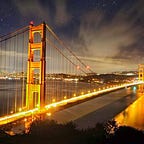My niece, who now lives in San Francisco, was getting married, so I made a flying five day visit to the Bay Area. Its been nearly 10 years since I spent time on the West Coast of the USA. But it had been nearly 20 years since the last family wedding, which was my own. At that time, my niece must have been 11 and a bridesmaid for us, and now here I was watching her get married. Never have I felt the passing of time so keenly. But what is the point of time passing if not to see young one grow up and become adults in the same way we did?
But my sense of time passing was felt even more keenly as I spoke to my niece and now nephew-in-law (do we say this?) and their friends. They both had STEM degrees from Ivy League schools and had worked at Jane Street. They could have had a table at the wedding for Anthropic employees only. To borrow from Tom Wolffe, I was looking at the new Masters of the Universe. While my own wedding was not as high powered, it certainly had its share of finance and tech people. But this new generation of Masters, contained a very high share of Mistresses as well. Gone was the 6’2 jock finance bro, replaced with the under 6 foot techie bro/sis/other.
Talking to them, I realised that they had no problem understanding this market, as this was part of “their” world, the world they grew up in, and were helping to create. Old school traders had different information sources that they used to make money. Flows, insider information, smart money, economic indicators. The new school used algorithms and scraped the internet. I made good money from 2000 to 2015, because I had spend the 1990s living and studying in Asia, and when it became a China led market, I knew what to do. My niece and her friends had lived and studied tech in the US, and the market had come to them. For them surging semiconductor prices makes sense, as it is obvious to them the benefit of paying up for cutting edge semiconductors based equipment, while I am happy to work on a 10 year old laptop and 2 year old mobile phone.
Perhaps what really ages me is the expectation that technology should be deflationary. I know that it has not been wildly deflationary for 10 years now, but it is hard not to expect productivity increases to drive wildly lower prices for things , which is what we saw from 1980 to 2010 and now something that seems to happen only in China. I wonder if this is an old man habit - of seeing the past repeating itself, even though the world has changed. For me this would be just like the oldies when I started in finance would explain in great detail why bond yields were about to rise even as they began their relentless march lower.
My trip to the West Coast also reminded me of how much China and the US are similar, while in contrast the UK and Japan are much more similar. This sounds odd, as linguistically and culturally UK and US should be similar, and Japan and China should be similar. But what the US and China share is the primacy of money and profits in relationships. As long as their is transfer of money or a promise of money, then all relationships work well. In Japan and the UK, money of course helps, but culturally money is not the only driver. Other concepts are at work, which is why American and Chinese always think the Japanese and British are so polite (“Oh you are doing this without expecting money? Amazing!”). The best possible explanation I have ever heard for this is the continued existence of a royal families in the UK and Japan, who set an example of behaviour that is beyond the grubby drivers of greed. This probably seems crazy to Americans and Chinese, but when you an island nation that faces large rich competitors, setting up a system that breeds loyalty and that does not rely on money is an effective system ((the UK navy found that sailors far from home fought harder for king and country, and the uncertainty of booty (the old meaning of booty)).
As I travelled around Berkeley and Sonoma, I struggled to understand why the US political system is so turbulent. Compared to UK, population density seems much lower, and yet the President is mobilising the army and national guard to keep immigrants out. But then I remembered, the US is all about money. And the president seems determined to raise earnings of blue collar workers, and the mega wealthy, while leaving the middle class to further decline. There is a political logic to this, but as an old man, who grew up with the political idea that the middle class acted as political ballast to keep a country stable, it strikes me as odd.
But them coming back to technology - perhaps there is no need for a middle class anymore. It is truly remarkable what a single person can do these days, and this is true in markets as in life. (If I went back to the 1990s and told people I write an international read newsletter, while spending my free time making videos, they would assume this would consume all my time - but technology has freed me). Tesla, Meta, Nvidia and Oracle are all companies that are driven and controlled by single minded men. US politics has become the same. Technology has freed the individual to achieve everything it can without the need for institutional support. Trump has come to dominate the Republican party without the initial support of its institutions. SpaceX has clobbered the traditional space institutions of Nasa and Boeing. Social media has destroyed the institutions of newspapers and TV. Crypto is trying to destroy the institution of politically control financial system.
If there is difference between the US and China it is entirely political. The open US political system has allowed a social media, and a totally “modern” President to attain power, which is allowing the new tech powers to become entrenched (forget about antitrust or regulation). While China has remained a closed politically system, where more traditional institutions remain in power. Historically speaking, nations that allow new industrial changes to drive political revolution have prospered (see Industrial Revolution, French Revolution, Meiji Restoration), while countries that have rejected politically modernisation have been subject to revolution and colonisation (see China pre-1945, Russia pre-1915, India pre-1945). The problem is that China DOES seem to have accepted new technology, but has it been able to assimilate modern technology into its political system? Is the Great China Firewall a template for other nations? I don’t know.
In San Francisco, I felt that Americans were at ease with these technological changes. Maybe 15 to 20 years ago, the American economic model of wide income inequality, and the emphasis of individual over society was probably seen as an anachronism, and that slowly by surely America would become like the rest of the west. What I saw in Berkeley, the home of wokeness, is an ease with individual pursuit of happiness even if it degrades society as a whole. And I must say I see similar ease with my own children, despite growing up in the UK.
Technology has freed the individual. But it is destroying the institutions that have existed for most of my life. Do we really need central banks? Or universities? Or governments, when they seem unable to either cut spending or raise taxes from dominant corporates? In San Francisco I saw the techno libertarian future - a society that in market terms would suggest being long equities and short “government” bonds. And this is a trade that continues to work - far beyond anything we have seen in the post World War II period.
Old men pine for a long lost world, while the young seek their place in the new world. In San Francisco, I think I saw that the old world is not coming back.












